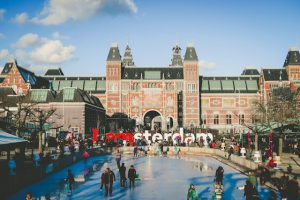The world is increasingly openly in conflict. Espionage, cyber attacks, economic advantage and disinformation are deployed as weapons with which countries delineate their spheres of influence and pursue their interests, at the expense of others if necessary.

The balance of power is changing and the question is what the world order will look like. For the Netherlands, which owes so much of its peace and prosperity to international trade and to a world order based on rules, this entails great risks. This is evidenced by the multitude of threats the Netherlands faces. So states the AIVD in its 2024 annual report.
DGAIVD Erik Akerboom: "We are going through a shift. From a situation where our security seemed to be taken for granted, to a situation where it has become the main concern for many Western countries. From insecurity as the exception, to insecurity as the rule. The service is making every effort to meet the current challenges and be prepared for various scenarios regarding geopolitical developments.'
The biggest shift in thinking about security in Europe, comes from the threat posed by the Russian regime. The Kremlin and affiliated networks and organizations took a more aggressive, brazen and provocative stance against European countries in 2024. They spied, organized covert disinformation campaigns to influence public debate and carried out cyber attacks. The regime used sabotage bordering on state terrorism to spread fear in Europe. We have also seen acts that can lead to sabotage in the Netherlands. The AIVD, together with the MIVD, recognized these in time and were able to stop them.
In 2024, the AIVD and MIVD attributed a cyber attack on a Dutch defense network directly and publicly to the Chinese state for the first time. The attack showed intent to spy on the Dutch government and political targets. Moreover, China pulled together with Russia to ensure that the West would have less influence in the world. The countries cooperated more closely politically, economically and militarily, even though they sometimes have different interests. Although China does not basically supply arms and munitions to Russia, Chinese companies did supply dual-use goods for the Russian war industry, even attack drones. This made China a direct player in Europe's security and a threat against the Netherlands and allies.
The war between Hamas and Israel escalated into a broader military conflict in the Middle East in 2024. The Gaza war thus also put pressure on the social stability of the Netherlands. The danger of a seriously polarized debate was evident in the riots and use of violence against after the Ajax-Maccabi Tel Aviv soccer match. The violence came not from already known extremists, but from individuals who took matters into their own hands and in the actions they committed were motivated by an extremist ideological framework.
The threat of jihadist attacks increased further in 2024. We have seen a return of stimulated and instigated attacks in Europe. Jihadists and other extremist Muslims carried out 11 attacks in Europe last year. Several dozen attack plots were prevented by intelligence and security services. Among them around the European Football Championship in Germany and around the Olympic Games in France. The AIVD was able to contribute to several such disruptions.
Attacks by right-wing terrorists are also conceivable. The AIVD disrupted several right-wing terrorist threats. These often involve young people, including minors. Moreover, for the first time, supporters of anti-institutional extremism in the Netherlands have been charged with terrorist crimes. They had concrete plans to carry out so-called "civilian arrests" on a mayor and police officers and possessed weapons.
Criminal networks deploy specialized, in-house "intelligence teams" to monitor people they see as threats, such as lawyers or journalists. As a result, the networks are better able to carry out attacks. Criminal intelligence teams sometimes infiltrate parts of the government to obtain information. AIVD research contributes concretely to preventing such attacks. And that the government can tighten policy and regulations where necessary in order to better combat criminal undermining.
At a time of great tension, the AIVD provides the government with independent intelligence on the world's security situation. Many AIVD investigations last year dealt with the changing balance of power in the world and international conflicts. In recent years, threats sometimes developed so quickly that the AIVD had to start new investigations and shift priorities in a short period of time. Especially in non-military conflict between states, the intelligence and security services help protect the national security of the Netherlands. With strong intelligence positions, the AIVD helps the government understand other countries' intentions and plans, even if they are covert.

